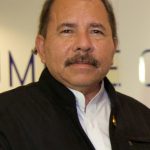Politics
Nicaragua Politics
This page explores Nicaragua’s political structure incorporating real-time RSS feed news and videos. By harnessing the power of RSS feeds, visitors can stay informed about the latest developments in Nicaragua’s politics as they happen. The dynamic nature of these feeds ensures that users receive up-to-the-minute updates on political events, policy changes, and significant milestones, enabling them to stay abreast of the ever-evolving political scene.

Daniel Ortega
President of Nicaragua
Incumbent
Assumed office
10 January 2007
Image credit
Nicaragua functions as a presidential republic with a unitary system of government. The President of Nicaragua serves as both the head of state and head of government, elected by popular vote for a five-year term with the possibility of reelection. The President appoints the Council of Ministers, which forms the executive branch. The National Assembly, a unicameral legislature, is composed of deputies elected by proportional representation, and it holds legislative powers.
Nicaragua has experienced periods of one-party dominance, with the Sandinista National Liberation Front (FSLN) historically playing a prominent role in the country’s politics. The judiciary is nominally independent, but political influences have at times raised concerns about the rule of law. Local governance is organized into municipalities, each headed by an elected mayor and municipal council. Nicaragua’s political landscape has been marked by a mix of democratic practices and periodic challenges to political pluralism. The country has faced economic and social issues, and its political structure reflects ongoing efforts to address these challenges while promoting stability and democratic principles.
Unless other sources are listed, original content is provided by ChatGPT. ChatGPT may produce inaccurate information about people, places, or facts. #Nicaragua #NicaraguaPolitics #NicaraguaNews #NicaraguaNewsToday #NicaraguaRSSFeed #BlahFace



